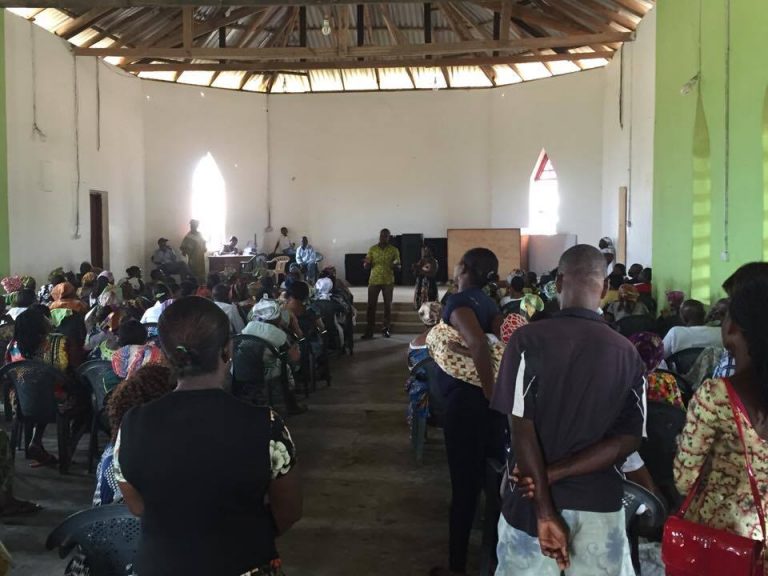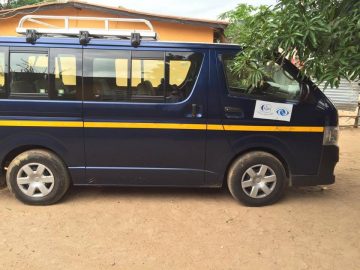UBC students have a variety of opportunities to get involved in Global Health, including the Global Health Initiative and the CFMS Student Exchange Program. However, some students find their own independent path towards global health participation. Sanjeeva Rajapakse (MD 2019) reflects on his experiences in Ghana through the Yale Unite for Sight program.
With the end of first year quickly approaching, I looked around and saw my classmates seeking international exposure during their summer off. Many had chosen to join UBC’s GHI on the multitude of international projects offered through the summer. Others had decided to do electives through the CFMS student exchange. The rest had booked plane tickets to explore the many wonders of Europe and Asia. As I had taken the previous year off to live abroad, I quickly realized that I too wasn’t satisfied with staying in Vancouver for the whole summer. I needed to do something abroad. I needed to go on another adventure.
Unite for Sight, is a non-profit organization, based out of Yale University that provides accessible and affordable eye-care to underserved communities in rural Ghana, Indian and Honduras. It does so through its outreach camps, which connect the eye clinics to these far-to-reach communities. In 2008, Unite For Sight fully-funded 5,011 of the 14,053 cataract surgeries (36%) performed by Ghanaian eye clinics. Since 2010, five of the forty-five ophthalmologists in Ghana have been partners of Unite For Sight, and these five ophthalmologists now provide nearly half of all eye surgeries in Ghana per year.
Reading about the work of Unite for Sight, I knew that this was the kind of opportunity that I could really do something with. This really looked like sustainable work making a real impact. With the program offering a research component that I wanted to do as well, I knew I had something going on here.
Through Skype talks with the research coordinator at Unite for Sight, we quickly found a research project that would best fit the community I would be researching. The project would be to evaluate the health education talks given by the partnered local eye clinics at the outreach camps. These health education talks inform community members about the work of Unite for Sight, the use of medication and eye glasses, and the importance of surgeries. I would be analyzing the effectiveness of these talks through patient understanding. I would be evaluating this through a post-talk survey, with the aid of a translator. Before I could do any of this though, I had to apply to the IRB board for research ethics approval. What usually takes 2-3 months to do, I had to finish in 4 weeks. Within 2 crazy weeks of draft writing, I managed to submit a BREB to the UBC IRB. Within another two weeks, I received minimal risk approval for my project. I was ready!
At the end of June, I headed to Ghana from Vancouver. The plan was to work in Ghana for all of July, 4 weeks in total. And so, I started work on that very first Monday with Crystal Eye Clinic. Each day, the health education talk was given to the community before the outreach camp began, and after each talk, I was given a warm welcome to the community members, introducing myself with the few local words that I knew. After the introduction, I dived straight into the research, hoping to get as many participants as I could for my research. We often skipped lunch, and worked all the way through the afternoon. Cliff bars were life to me. The clinics often drew over 100 patients a day, who would come to get their eyes checked, and receive treatment or referrals for their eye problems. While I didn’t have the man power to interview everyone, I did manage to interview usually 10 patients a day for my project. What I loved most about my experience was the fact that I was talking to so many of the locals. There were other volunteers with Unite for Sight helping at the camps with me, but they were mainly helping out with the visual acuity exam or dispensing out the drugs. They were kind of just a part of an assembly line, passing patients off one by one, while I had the liberty to really get to chat and talk with the patients. I felt that doing research was such an enriching experience, as I got to know the people who I was helping.
The clinics also do overnight outreaches to much more under-served areas that are too far to visit for a day camp. These excursions usually last a week at a time, and I had the opportunity to do two of them while in Ghana. The first overnight trip I did was with Crystal Eye Clinic to the Nzema region. This area bordered Cote d’Ivoire, and so many of the patients that we saw were Ivorians. On one particular day, we saw a massive surge of Ivorians crossing the border to get free eye care. We saw 450 patients that day…It was absolute chaos. The two ophthalmic nurses were completely swamped, each taking on more than 200 patients that day. The camp was so overwhelmed, that I had to halt my research that day, and help out with the dispensing station, as my French was better than anyone else’s. But still, the Ivorians swarmed in on us, with prescriptions in hand, trying to get taken care of first. As the head ophthalmic nurse stated at the end of the day, it was the “worst camp” he has ever done.
After collecting data for two weeks with Crystal Eye Clinic, I switched onto another clinic, St. Thomas Eye Clinic. St. Thomas Eye Clinic was a smaller clinic than Crystal Eye Clinic, and so their camp numbers were smaller as well. However, what was interesting to note, was that St. Thomas Eye Clinic did not give the health education talks in their camps. Thus, I so happened to have the perfect control to compare my results with Crystal Eye Clinic. What I noticed was that there was a large gap of knowledge among the patients at the St. Thomas Eye Clinic. Fewer patients were able to correctly answer the questions that I had asked previously with Crystal Eye Clinic patients. Patients for example could not say what sunglasses are for, or how to take care of one’s eye drops. Mostly all patients could not explain what cataract surgery was either. These differences really hit home on the point of health education to me, and really showed me why education is such an important aspect to care, as it can lead to complications to eye care management because of patient’s risky behaviour and non-adherence.
By the end of the four weeks, I had amassed roughly 160 interviews, travelled through most of Southern Ghana, and had amazing times with the local Ghanaians and my fellow volunteers. I was also able to drop in on a few OR days with St. Thomas Eye Clinic, watching local surgeons perform cataract and pterygium surgeries with the resource they had. While not working, I spent my times around Accra, meeting up with expats, and enjoying the fashion and political scene. The people I’ve met in Ghana have definitely left a mark on me, making me cherish conversation and social interaction with others.
The research that I’ve done this past month, I hope to present back to the community that I worked in. This is a hallmark of responsible research as the community taking part in the research benefits the most from it. I’m also looking into local community journals in Africa where I could publish the data as well. My major goal this year though is to present my research at the Unite for Sight’s Global Health conference at Yale. This would be my first poster presentation, but also a great reunion with my fellow Unite for Sight volunteers, and the other UBC GHI groups that will be presenting there as well. I’m sure it will be a nostalgic weekend all together, remembering that time I travelled to Ghana.

